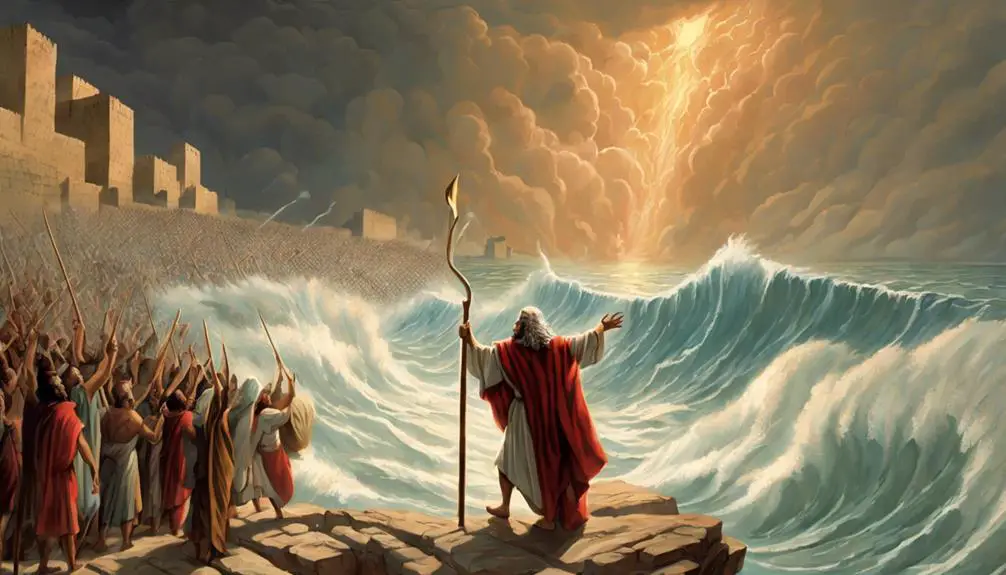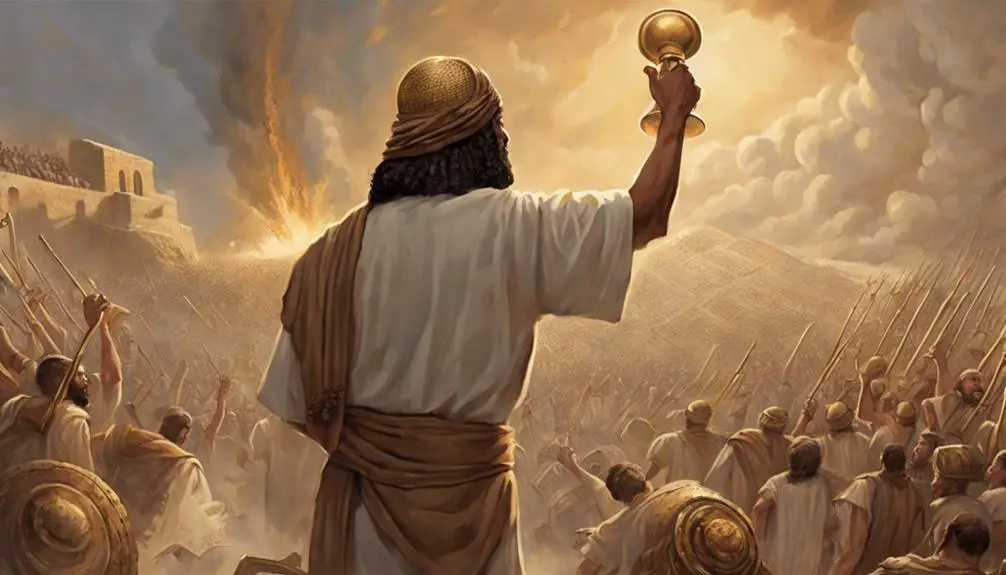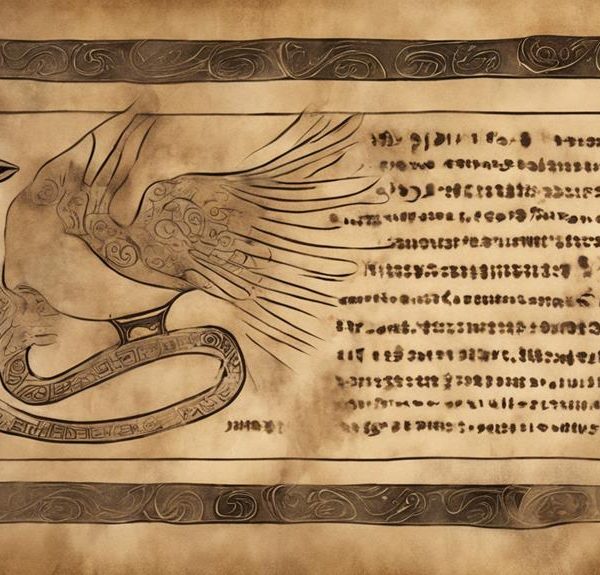Gain insight from biblical tales of bravery, where ordinary individuals confront extraordinary challenges, and learn what it means to truly be courageous.

Courageous People in the Bible
Isn't it curious how, at moments when you're seeking inspiration, stories of courage from the Bible seem to find their way to you? You've likely heard of David's daring against Goliath or Esther's bold stand for her people, but there's more to these tales than meets the eye.
Each narrative, from Daniel's unwavering faith in the lion's den to Moses leading the Exodus, offers unique insights into bravery that transcends time. As you explore these stories, you'll discover that courage isn't just about facing giants or conquering cities; it's about the choices made in the quiet moments that define destiny.
What might they reveal about your own journey?
Key Takeaways
- Faith and courage in biblical figures often lead to divine intervention and miraculous outcomes.
- Ethical steadfastness and non-compromise on beliefs underscore the courage of biblical heroes.
- Courage in the Bible is frequently linked to leadership and the protection of others, even at personal risk.
- The legacy of biblical courage is marked by trust in a higher power and the triumph over seemingly insurmountable challenges.
David and Goliath

In the biblical narrative, David's confrontation with Goliath stands as a testament to the power of faith and courage over seemingly insurmountable odds. This story, deeply embedded in religious and cultural ethos, epitomizes the shepherd's bravery in the face of a challenge that many would deem impossible. David, a young shepherd, armed with nothing but a sling and his unwavering faith in God, steps onto the battlefield to face Goliath, a giant who's left the mightiest warriors trembling.
This account goes beyond a mere physical battle; it delves into the realms of spiritual warfare and the triumph of divine will. The giant's downfall serves as a powerful metaphor for overcoming the Goliaths in one's life through faith and courage. David's victory isn't attributed to his physical strength or combat skill but to his profound belief in a power greater than himself. It's a narrative that encourages you to confront your giants, armed with faith as your sling and stones.
Analyzing this story, you're invited to reflect on the essence of true courage and the impact of unwavering faith in overcoming obstacles. The shepherd's bravery and the giant's downfall aren't just historical events but timeless lessons on the victory of faith over fear.
Esther's Courageous Stand

Facing immense personal risk, Esther's courageous stand against a decree that threatened her people exemplifies the profound impact of bravery and faith in dire circumstances. In the heart of royal intrigue, Esther, a queen concealed by her Jewish identity, navigates the perilous corridors of power to save her people from annihilation. This story, set against the backdrop of ancient Persia, highlights the complexities of gender dynamics within the royal court. Esther's situation underscores the limited agency women held, yet magnifies her bravery as she leverages her position for a greater cause.
Esther's approach to confronting the king demonstrates a sophisticated understanding of the power dynamics at play. She doesn't rashly expose the plot against her people; instead, she strategically invites the king to banquets, gradually building a context to present her plea. This method, while fraught with personal risk, showcases Esther's wisdom and courage in the face of systemic constraints.
Her story is a testament to the power of faith and the courage to act righteously, despite the potential cost to oneself. Esther's stand against oppression, within the confines of her gender and position, not only averts disaster for her people but also offers a timeless example of how courage, combined with faith, can overcome seemingly insurmountable odds.
Daniel in the Lion's Den

Daniel's ordeal in the lion's den, a narrative of unwavering faith amidst life-threatening adversity, offers profound insights into the dynamics of divine protection and personal conviction. You see, when you're faced with trials that seem insurmountable, the story of Daniel serves as a beacon of hope, demonstrating the power of steadfast belief in the face of dire consequences.
Divine intervention and angelic protection aren't merely elements of ancient tales, but cornerstones of a faith-driven existence. Daniel's experience underscores a profound truth: when you stand firm in your convictions, even in the face of seemingly inevitable peril, the divine is not just an observer but an active participant in your life.
Aspect |
Insight |
Application |
|---|---|---|
Faith |
Unwavering in adversity |
Inspires resilience |
Divine Will |
Protection through angelic intervention |
Encourages trust in divine timing |
Moral Integrity |
Non-compromise on personal beliefs |
Guides ethical conduct |
Divine Intervention |
Manifests in dire situations |
Strengthens belief in higher power |
In dissecting Daniel's story, you're invited to reflect on the essence of your own faith. It's a narrative that doesn't just tell a story—it invites you into a deeper understanding of what it means to live a life guided by divine will and protected by unseen forces.
Moses Leading the Exodus

Moses' leadership during the Exodus embodies an unparalleled test of faith and courage, as he guided an entire nation through the wilderness towards freedom. His story, deeply revered, showcases not just a journey of physical liberation but also an indomitable spirit facing seemingly insurmountable challenges.
- Plague confrontations: Moses' confrontations with Pharaoh, demanding the release of the Israelites, were marked by ten plagues. These plagues, ranging from rivers turning to blood to the death of the firstborns of Egypt, were both a demonstration of divine power and a testament to Moses' unwavering faith in God's commands.
- Parting the Red Sea: Perhaps the most iconic moment, Moses' parting of the Red Sea, stands as a symbol of divine intervention and leadership. His faith allowed him to lead his people through the sea on dry ground, a feat that remains one of the most miraculous in biblical history.
- Guidance in the wilderness: Moses didn't just lead his people out of Egypt; he also guided them through the daunting wilderness. His leadership, characterized by faith and resilience, ensured their survival and adherence to divine laws.
Moses' journey is a profound narrative of faith, leadership, and the courage to confront the impossible, leaving a legacy that endures in the hearts of the faithful.
Joshua Conquers Jericho

Building on Moses' legacy of faith and leadership, Joshua's conquest of Jericho exemplifies another monumental moment of courage and divine guidance in biblical history. You're invited to explore the strategic and miraculous nature of this event, particularly focusing on the innovative wall tactics and Rahab's critical role.
Joshua's approach to Jericho wasn't conventional warfare but a blend of divine command and psychological warfare. The Israelites circled the city for six days, and on the seventh, with a blast from their trumpets, the impenetrable walls collapsed. This wasn't just a military victory; it was a profound demonstration of faith in action. The wall tactics weren't of human design but a divine strategy, showcasing that success in this endeavor was attributed not to military might but to unwavering faith in God's promises.
Rahab's role is equally pivotal. Her courage to shelter Israelite spies, betraying her city but securing her family's safety, highlights a complex intersection of faith, redemption, and divine selection. Her actions, driven by a belief in the God of the Israelites, underscore the narrative that courage combined with faith can alter destinies, marking her as an indispensable ally in the conquest of Jericho.
Frequently Asked Questions
How Did the Concept of Courage in the Bible Influence Early Christian Communities in Their Daily Struggles and Persecution?
You'd find that the concept of courage greatly inspired early Christian communities as they faced daily struggles and persecution. By looking up to examples of Christian martyrdom, you're witnessing how they found strength and resilience.
This reverence for perseverance under duress not only bolstered their faith but also fostered a sense of unity and purpose amidst adversity. Their endurance in the face of persecution became a foundational aspect of their identity and growth.
Can the Courage Displayed by Biblical Figures Be Interpreted Differently in the Context of Modern Psychological Understanding?
Absolutely, you can interpret the courage of historical or mythical figures through the lens of modern psychological understanding. This approach allows you to see their actions as not just brave but as examples of modern resilience and psychological heroism.
Analyzing their stories with this perspective sheds light on their struggles and triumphs in a way that resonates with contemporary challenges, offering insights into the timeless nature of courage and its relevance today.
Are There Lesser-Known Biblical Figures Whose Acts of Courage Significantly Impacted the Course of Biblical History, but Are Often Overlooked?
Absolutely, there are hidden bravery tales of uncelebrated heroes whose actions have significantly shaped the biblical narrative, yet they're often overlooked.
These lesser-known figures displayed remarkable courage that, when examined, reveals a deeper understanding of faith and resilience.
Their stories offer profound insights into the complexity of human nature and the power of conviction, enriching the broader tapestry of historical and spiritual lessons we draw from these ancient texts.
How Do Different Religious Denominations Interpret and Teach the Stories of Courage From the Bible to Their Followers in Contemporary Settings?
You'll find that various religious denominations bring their unique interpretations to teaching courage narratives from the scriptures in contemporary settings. Through denominational rituals and specific teachings, they dissect these stories, highlighting the moral and spiritual lessons embedded within.
This approach not only preserves the reverence for these ancient tales but also ensures that the essence of courage depicted is analytically and thoughtfully conveyed to modern believers, enriching their spiritual journey.
What Parallels Can Be Drawn Between the Courage Shown by Biblical Characters and the Actions of Historical Figures in More Recent Times?
You can draw parallels between historical figures' courageous actions and biblical characters by examining their military strategies and cultural impact.
Like biblical heroes, leaders in recent history often displayed bravery in the face of adversity, employing strategic thinking that echoes the tales of old.
Their actions, much like those in the Bible, not only shaped battle outcomes but also left a lasting cultural impact, inspiring generations to act courageously.
Conclusion
In analyzing these biblical narratives, it's evident that courage isn't merely an act of valor but a profound expression of faith.
You've seen how David, Esther, Daniel, Moses, and Joshua exemplified unwavering bravery in the face of formidable challenges. Their stories teach you that true courage stems from trust in a higher power, guiding you to confront your Goliaths with confidence.
Thus, these accounts aren't just historical anecdotes; they're timeless beacons of inspiration for navigating life's trials with faith and courage.



Sign up